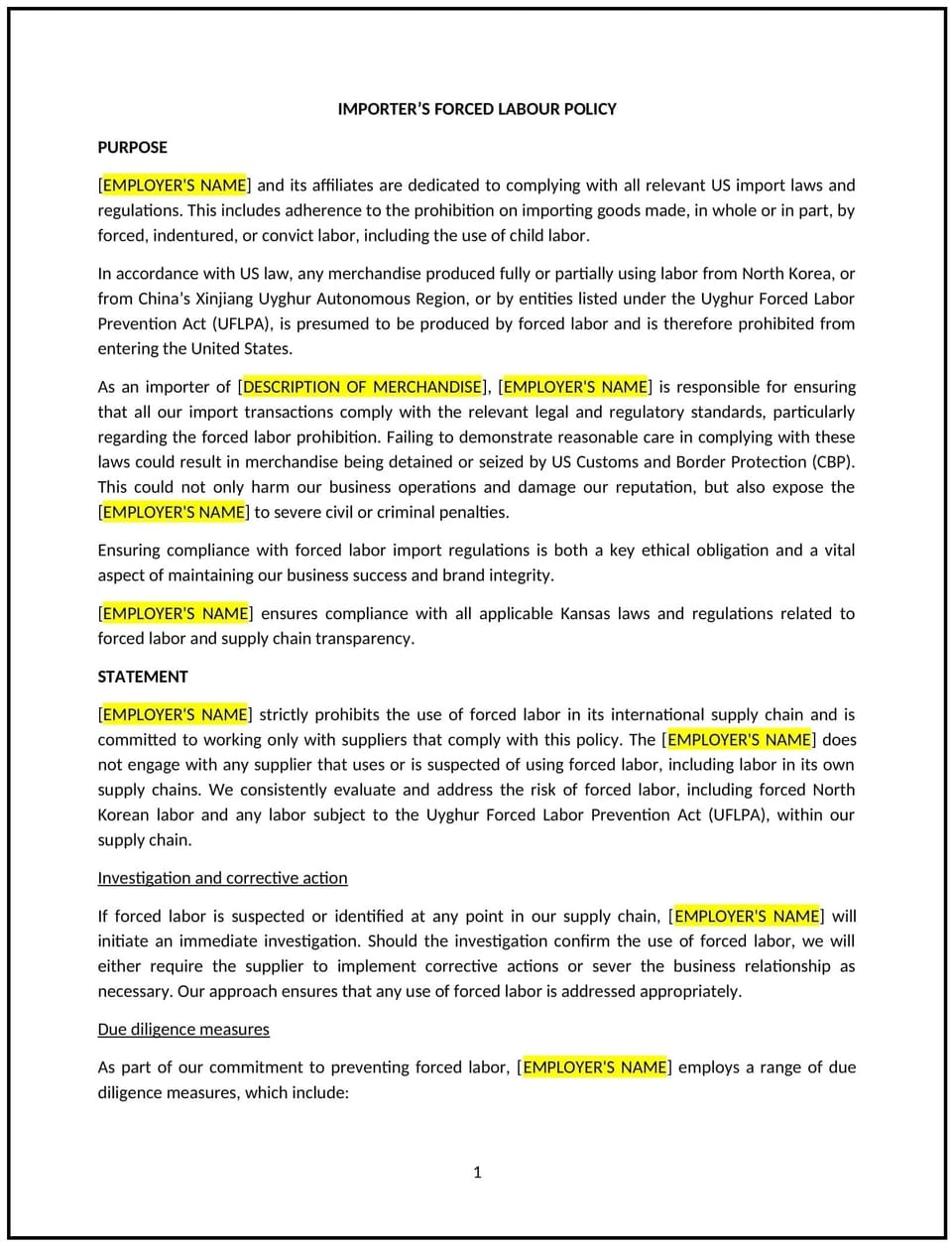Importer's forced labour policy (Kansas): Free template

Importer's forced labour policy (Kansas)
An importer's forced labour policy helps Kansas businesses take a firm stand against the use of forced or child labor in their supply chains, ensuring that all products imported into the company comply with ethical labor standards. This policy outlines the steps the business will take to prevent forced labor in the sourcing, manufacturing, and distribution of products.
By implementing this policy, businesses can promote ethical sourcing practices, protect their reputation, and support compliance with relevant legal requirements, while contributing to the global fight against human trafficking and exploitation.
How to use this importer's forced labour policy (Kansas)
- Define forced labor: Businesses should provide a clear definition of forced labor, including involuntary servitude, human trafficking, debt bondage, and child labor, to ensure that all employees and suppliers understand what is unacceptable.
- Establish supplier requirements: Businesses should require suppliers and manufacturers to certify that their products are free from forced labor and to undergo regular audits to ensure compliance.
- Conduct due diligence: Businesses should implement procedures for evaluating and monitoring their suppliers, ensuring that forced labor is not present in the supply chain. This could include inspections, worker interviews, and third-party audits.
- Implement corrective actions: If forced labor is identified in the supply chain, businesses should take immediate corrective action, such as terminating contracts with offending suppliers or helping affected workers to seek redress.
- Encourage transparency: Businesses should encourage suppliers to disclose their labor practices and improve transparency by publishing findings from audits and assessments.
- Provide training and awareness: Businesses should offer training for employees and suppliers to raise awareness about forced labor and human trafficking issues, and ensure that all staff understand the importance of compliance with the policy.
- Review and update regularly: Businesses should periodically review and update the policy to reflect changes in legal requirements, industry standards, or company operations.
Benefits of using an importer's forced labour policy (Kansas)
- Promotes ethical sourcing: Ensures that products are sourced responsibly, free from the exploitation of workers and vulnerable populations.
- Protects company reputation: Businesses that prioritize forced labor-free supply chains enhance their reputation as socially responsible companies.
- Reduces legal and financial risks: Prevents legal and financial consequences that could arise from unknowingly importing products made with forced labor.
- Supports global human rights efforts: By taking action against forced labor, businesses contribute to global efforts to combat human trafficking and labor exploitation.
- Builds trust with customers and stakeholders: Customers and investors are more likely to trust businesses that operate ethically and take steps to ensure their supply chains are free from forced labor.
- Encourages supply chain transparency: Increases accountability within the supply chain, promoting better working conditions and fair treatment of workers.
Tips for using this importer's forced labour policy (Kansas)
- Communicate the policy clearly: Businesses should ensure that employees, suppliers, and contractors understand the forced labor policy and their role in adhering to it.
- Regularly audit suppliers: Businesses should conduct regular audits of suppliers to ensure compliance with the forced labor policy, including third-party audits if necessary.
- Take action against violations: If forced labor is identified, businesses should act swiftly to address the issue, including severing ties with non-compliant suppliers and offering support to affected workers.
- Foster supplier relationships: Businesses should work closely with suppliers to help them improve their practices and meet the ethical standards required by the policy.
- Provide training: Businesses should offer ongoing training for both employees and suppliers on how to recognize and address forced labor and trafficking issues in the supply chain.
- Monitor legal developments: Businesses should stay updated on changes in local and international laws regarding forced labor to ensure that their policies and practices remain current and compliant.
Q: Why should Kansas businesses implement an importer's forced labour policy?
A: Businesses should implement this policy to ensure that their supply chains are free from forced labor, protect their reputation, reduce legal risks, and contribute to global human rights efforts.
Q: What is considered forced labor under this policy?
A: Forced labor includes practices such as involuntary servitude, human trafficking, child labor, and any work performed under threat or coercion, often without fair compensation.
Q: How can businesses ensure their suppliers are free from forced labor?
A: Businesses should require suppliers to sign agreements certifying their compliance with forced labor-free practices, conduct regular audits, and take corrective actions if violations are discovered.
Q: What should businesses do if they discover forced labor in their supply chain?
A: Businesses should take immediate corrective action, such as ending relationships with non-compliant suppliers, reporting the situation to authorities, and providing support for affected workers.
Q: How often should businesses audit their suppliers for forced labor compliance?
A: Businesses should conduct regular audits, ideally on an annual basis or more frequently for high-risk suppliers, to ensure compliance with forced labor-free standards.
Q: How should businesses handle cases where suppliers are unwilling to provide transparency about their labor practices?
A: Businesses should view a lack of transparency as a red flag and may need to terminate the relationship with the supplier. It is essential to work only with suppliers who are willing to openly discuss and address labor practices.
This article contains general legal information and does not contain legal advice. Cobrief is not a law firm or a substitute for an attorney or law firm. The law is complex and changes often. For legal advice, please ask a lawyer.


